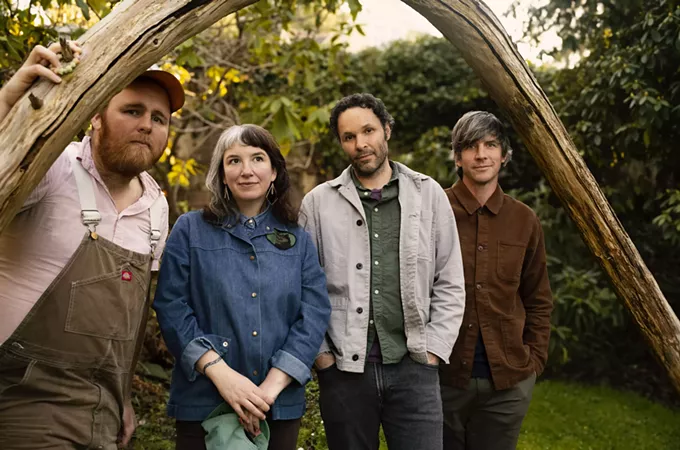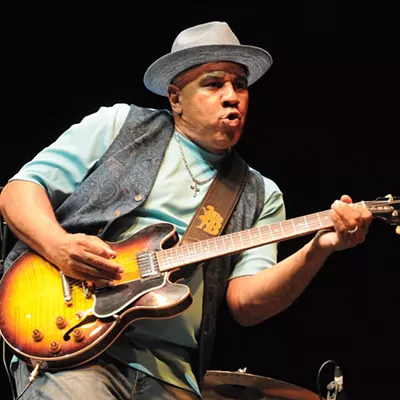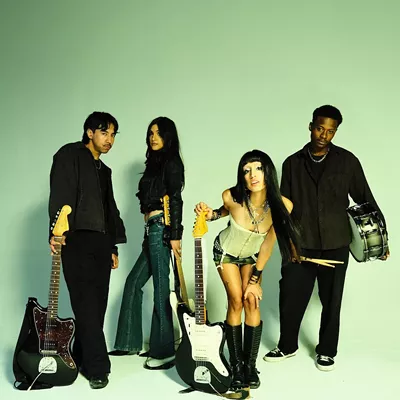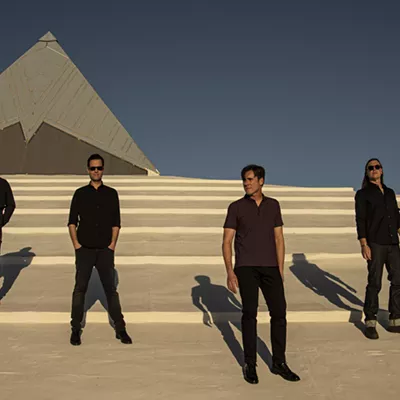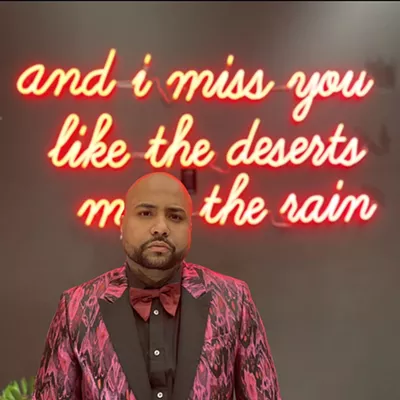In the ever-evolving landscape of pop music, the announcement that a band is going “on hiatus” often doesn’t bode well for its future. So for Blind Pilot fans who had watched seven years go by without the release of a new album, the likelihood of the group reuniting appeared slim at best.
All that changed earlier this year with the release of Blind Pilot’s fifth album, “In the Shadow of the Holy Mountain.” The Portland-based indie-folk band, known for its intimate storytelling and lush instrumentation, emerged from its extended break with a renewed spirit and a transformative approach to making music. And no one was more surprised by that than the band members themselves.
“It feels miraculous that this all came about the way it did after so many years of trying,” said bandleader Israel Nebeker, who’d reached the point where he didn’t know if there’d ever be a fifth album. For the first time, he’d found himself at a total loss when it came to writing new Blind Pilot songs.
“I read a lot of books on writer’s block and did some therapy around it for quite a bit,” he explained. “But I don’t think writer’s block really felt like what I was going through. It wasn’t like I was sitting there at my writing desk and banging my head against it. I could write; it’s just that the songs didn’t want to come through the way that they typically do.”
After years of trying, Nebeker came to a realization. The type of songs he’d been trying to write wouldn’t work for Blind Pilot. But they could for a solo project. So he set about making a deal with his muse and the songs that were just out of reach.
“I said, ‘OK, how about if this is a solo album, I won’t censor you,’” the singer-songwriter recalled. “Whatever you come through as, I’ll bring you through, and I will take care of you. I won’t expose you to the scrutiny of anyone. You’ll just be mine. And that’s when the songs started coming again.”
Nebeker was soon writing enough material to record his own album, which he aims to release next spring. But the solution to one dilemma had led to the creation of another.
“At that point, I had a very tricky problem on my hands,” he said. “I had to go to my band and say, ‘Hey, thanks for waiting, like, five years for me to write another album. I have one. But it’s a solo album, not Blind Pilot.’ And I didn’t want to deliver that message to them.”
As it turned out, he didn’t have to, thanks to a lucid dream that made perfect sense, at least for a moment. “The thought was, just write a Blind Pilot album in a month, and whatever comes through, you can just give that over to the band, and it’ll be easy,” Nebeker said.
“And I thought, ‘Yeah! That’s the solution!’ And then I woke up and thought, ‘What am I crazy? How am I going to do that?’” But he did, and the band found itself back in the studio with an album’s worth of songs and a reputation to live up to. Inspired by artists ranging from Joanna Newsom and Gillian Welch to Bright Eyes and Neutral Milk Hotel, they’d progressed from the stripped-down charm of 2008’s “3 Rounds and a Sound” to the more expansive arrangements of 2016’s “And Then Like Lions.” Then, “In the Shadow of the Holy Mountain” became their most significant leap yet and in more ways than one.
The most significant shift for Nebeker was learning to let go of his need to “protect the songs” and be involved in every aspect of the record. This change in mindset led to a more collaborative and adventurous atmosphere in the studio.
“I wanted to focus on the band as its own living entity, and less about the songwriting part of it,” Nebeker said. “I said this time I’m just the songwriter and the singer, and that’s my only role. And that sense of respect and trust started to create a real camaraderie, this feeling of adventure where everyone was kind of magically invested in everything we were doing.”
The adventurous approach was complemented by producer Josh Kaufman’s exploratory methods in the studio, which captured the essence of live performances, while pushing the boundaries of the band’s sound. That expertise allowed for a spontaneous creativity, resulting in unexpected transformations of songs like “Just a Bird,” which gained its up-tempo drum beat in the chorus during the recording process.
The group — which performs Tuesday, Nov. 19, at Hotel Congress Plaza — also took advantage of the fact that it was recording in a century-old church that had been converted into a studio, adding a unique ambiance to the sessions. That was particularly the case on the song “Coming Back,” which was recorded in darkness.
“The reason I asked to turn the lights off,” Nebeker said, “was because there was something about that song in that space where I only wanted to hear it. I didn’t want to be reminded of anything visual. I just wanted to be with the piano and my voice in that large, grand space.
“It’s not that I’m into the religion thing,” he added, “but I do love intentionally meaningful spaces, whether it’s a dojo or a yoga studio or a church or a temple.”
Or, for that matter, a mountain, like the holy one that gave the album its name. Nebeker saw it in a vision during a shamanic drum journey to northern Scandinavia, where he sought to reconnect with his ancestral lineage.
“I think that traveling, especially when it’s off the beaten path, is definitely something close to a spiritual practice,” Nebeker said. “Right now, it’s very easy to be afraid of what’s foreign and unknown. But when you put yourself out there vulnerably, I have found that people show up and repeatedly prove that everyone wants the best for each other.”
Blind Pilot w/Molly Sarle
WHEN: 6:30 p.m. Tuesday, Nov. 19
WHERE: Hotel Congress Plaza, 311 E. Congress Street, Tucson
COST: Tickets start at $30.90
INFO: hotelcongress.com

